2024 Heat Pump Guide
Introduction
Welcome to our comprehensive guide on heat pumps! Whether you're considering installing a heat pump system or looking to learn more about this energy-efficient heating and cooling technology, you've come to the right place. In this guide, we'll address common questions, provide insights about installation costs, discuss performance and sizing, offer installation and maintenance tips, and compare heat pumps with alternative heating and cooling systems.
What is a heat pump?
Heat pumps are air conditioners that can both heat and cool. Like air conditioners and refrigerators, they operate by moving heat rather than producing it through combustion or electric resistance. This allows heat pump systems to heat with 250-350% efficiency, making them a true energy-efficient system. That’s not a typo. It’s easier to move heat than to produce it so they’re able to provide 2.5-3.5 units of heat (output) for each 1 unit spent operating the system (input).
A heat pump is a fully electric heating and cooling system. In areas with low-carbon electricity grids (like Ontario), switching to a heat pump system from
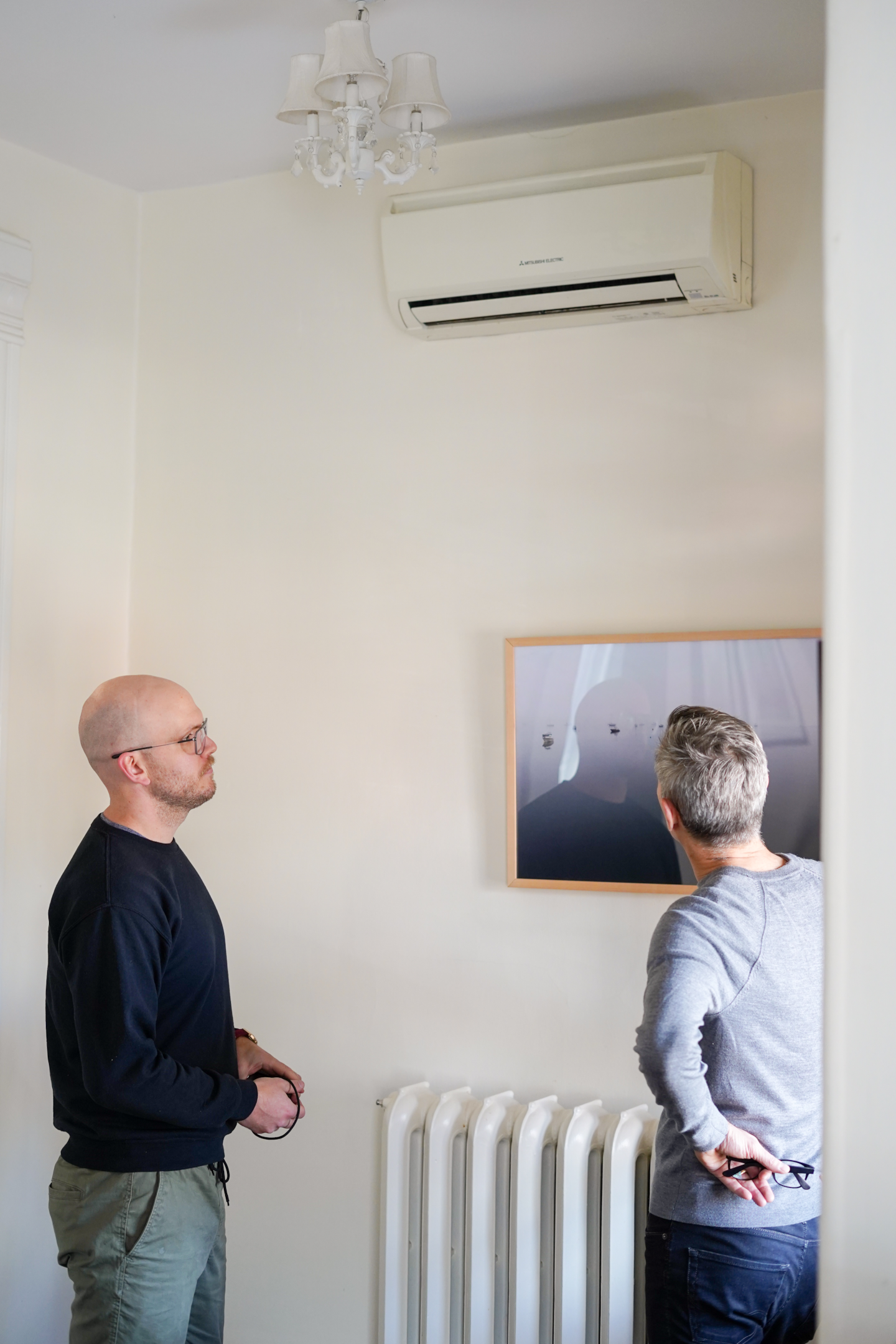
fuel-burning furnaces like gas, propane, or oil will significantly reduce the carbon emissions from your house. Solar panels can be installed to further reduce household emissions.
The underlying heat pump technology isn’t new. The systems are just getting better and more efficient at operating in lower temperatures. In the summer, a heat pump acts just like a high-efficiency air conditioner.
What is an air-source heat pump?
Air-source heat pump systems operate like air conditioners. They use the air as a source and sink of heat. They’re cheaper and easier to install. Air-source heat pumps come in two common varieties: central (ducted heat pump) and mini-split (ductless heat pump). The outdoor equipment for both systems looks like an air conditioner unit. The indoor air handler for a ducted system (i.e. a system that connects to existing ductwork) looks like a furnace. Mini-splits require ductless heads mounted on the wall in one or more places in the house. Ductless mini-splits are a good solution for houses with baseboard heaters or fuel-fired boilers.
What is a ground-source heat pump?
Ground-source heat pumps use fundamentally the same process but they use the ground as the source and sink of sink. Ground loops are installed horizontally or vertically outside of the house to allow for heat transfer between the system and the ground or body of water. They are more expensive and difficult to install but they have better cold-weather performance because the efficiency doesn’t depend on outdoor air temperatures. Ground-source heat pumps are also known as geothermal heat pumps.
How is a heat pump installed?
The heat pump installation process is similar to furnace and central AC installations. Both the indoor and outdoor units will be replaced and reconnected to existing ductwork. Heat pump installation generally takes 1-2 days. Electrical capacity is an important consideration to better understand if an electrical panel upgrade will be required.
Like all HVAC system installations, special attention should be paid to the commissioning process to ensure that the system is operating correctly. Poor installation of any heating or cooling system will reduce efficiency and shorten lifespan.
What is the efficiency of a heat pump?
Heat pump efficiency depends on the type (air-source or ground-source), make & model, and outdoor temperatures. On average, heat pumps are 250-350% efficient. The efficiency of air-source heat pumps decreases with outdoor temperature. Most cold climate heat pumps are 180-230% efficient at Toronto’s outdoor design temperature (-16’C).
Ground-source heat pumps maintain efficiency at lower outdoor temperatures because their efficiency is based on the temperature of the ground loops below the frost line. During shoulder seasons, there is minimal difference in efficiency between air-source and ground-source heat pumps.
Can a heat pump fully replace a natural gas furnace or oil boiler?
Yes, a heat pump can serve as a fully viable replacement for a natural gas furnace or oil boiler! Backup heat options can be installed to ensure sufficient heating capacity during extreme weather conditions.
A natural gas furnace cannot operate simultaneously with a heat pump to provide supplementary heat. However, it can serve as a backup heating option in a hybrid setup by activating the gas furnace at extremely low temperatures. However, keeping a natural gas furnace installed removes the opportunity for homeowners to cancel gas utility accounts, which require monthly account fees that total $300/yr in Ontario.
For properly sized heating systems, a natural gas backup will only operate for a few hours each year, which is why Jouleia normally recommends the simplicity of fully electric systems (i.e. heat pumps with electric resistance heating backup strips). Think of the heat strip as a mini toaster inside your heat pump, providing additional warmth when needed without relying on a separate gas furnace. However, hybrid setups might be the only reasonable option in homes with very high heat loads.
Do heat pumps work in Canadian winter?
A cold climate heat pump can work down to -30°C, producing 100% of its rated heating capacity at -20°C and 70-80% capacity at -30°C. These temperatures exclude wind chill and humidity, called “dry bulb temperatures”.
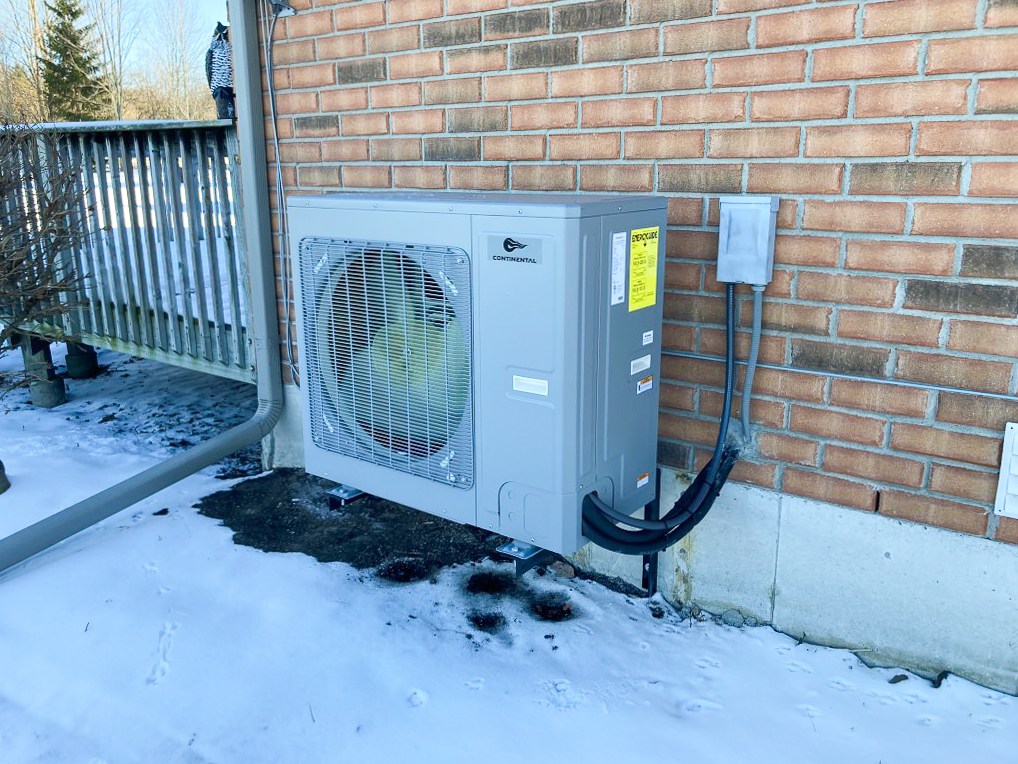
There hasn't been a single day in the last 30 years in Toronto with a dry bulb temperature below -30°C. Fully electric heat pumps include an air handler unit (AHU) with a resistance heat strip that serves as a supplementary heating source during extreme cold periods. While an electric heat pump can effectively heat homes in Canada’s climate for the vast majority of the year, the inclusion of a resistance heat strip ensures reliable warmth even during rare instances of extreme cold temperatures. This backup heating element provides peace of mind for homeowners, ensuring consistent comfort regardless of outdoor temperatures.
As an alternative, your existing natural gas furnace can function as a backup in what is commonly referred to as a "hybrid system." In this setup, the heat pump serves as the primary heating source, efficiently warming your home for the majority of the heating season. However, when outdoor temperatures drop below a predetermined balance point temperature, typically around freezing or slightly above, the system automatically switches over to the natural gas furnace for supplemental heating.
It's important to note that in a hybrid system, the heat pump and natural gas furnace cannot operate simultaneously. Instead, the system intelligently selects the most appropriate heating source based on outdoor conditions and efficiency considerations. This seamless transition ensures that your home remains consistently comfortable, regardless of the weather outside.
Can a heat pump replace both a natural gas furnace and an AC?
Yes, a heat pump can replace both a natural gas furnace and an air conditioning (AC) system. Heat pumps are versatile HVAC units that provide heating and cooling. Heat pumps have several benefits compared to traditional systems:
-
Energy Efficiency: Heat pumps are known for their energy efficiency, as they transfer heat rather than generate it, resulting in lower energy consumption compared to traditional heating and cooling systems.
-
Year-Round Comfort: Gas furnaces generally come in sizes of 5-ton or larger. More expensive modulating furnaces can adjust their heating output to 3 tons. Most houses in Toronto have heating loads of 2-3 tons during the coldest days of the year. Oversized furnaces cause comfort problems because they aren’t able to properly match the heating load throughout the year. Common heat pump sizing ranges from 1-4 tons, which allows them to be properly sized for Canadian homes.
-
Environmental Benefits: In areas with low-carbon electricity grids, heat pumps allow for environmentally friendly heating. Switching from a gas furnace to a heat pump in Ontario can save up to 10 tons of CO2e per year. In areas with high-carbon grids, rooftop or groundmount solar PV can be added to the house to lower heating emissions.
-
Indoor air quality: Similar to year-round comfort, the ability to properly size the heating system to the house allows the heating & cooling system to continually mix and filter the air. High-efficiency furnace filters (MERV-11 or higher) remove the majority of pollutants.
-
Cost Savings: In Ontario, heat pumps cost approximately the same as gas furnaces to operate. They’re significantly cheaper than propane and oil furnaces. If you’re able to replace your gas appliances with electric options, you also have the option to cancel your gas utility account, which saves an additional $300/yr in account fees in Ontario.
What is the average lifespan of a heat pump? How does this compare to a gas furnace?
The average lifespan of heat pumps and gas furnaces are both 15-20 years, if properly installed and maintained.
Do heat pumps require less maintenance than a gas furnace or ACs?
While both systems require filter replacement and the outdoor unit (AC or heat pump) to be washed periodically to remove debris, gas furnaces require additional maintenance in the form of annual inspections to reduce the risk of gas leaks and carbon monoxide poisoning.
How much does it cost to install a heat pump?
Installation costs for a heat pump in Canada vary based on several factors, including the type and heating capacity of the equipment, the complexity of the installation, regional labour rates, and contractor experience. Here are some scenarios for evaluating heat pump costs in Ontario:
-
Replacing AC with heat pump: If only the AC needs replacement, a heat pump can replace the AC and operate as a hybrid system with the existing furnace. Heat pump costs, including installation, can range from $6,000 to $14,000.
-
Replacing a furnace and AC with a heat pump: This will be a fully electric system that includes a heat strip for backup and supplemental heat. It requires no more maintenance than an AC and it allows homeowners to cancel gas utility accounts and eliminate the monthly fees (~$300/yr in Ontario). Installation costs range from $10,000 to $20,000. The largest variable is equipment selection and contractor experience.
-
Ground-Source Heat Pump: The biggest factor for installation costs is the orientation of the ground loops. Horizontal loop fields are cheaper but require a large outdoor area to install them. Vertical drilling saves space but each job is a custom solution that’s significantly more expensive. The volume and experience of contractors in the area is also a large factor. Horizontal projects range from $30,000 to $40,000 while vertical projects can be significantly more expensive. It is a fully electric system that allows homeowners to cancel gas utility accounts and eliminate the monthly fees (~$300/yr in Ontario).
-
Replace furnace with a hybrid setup (ASHP w/ gas furnace backup): Hybrid systems (also known as dual fuel systems) are only recommended if houses are too leaky or large for a single heat pump to service. Installation costs range from $10,000 to $15,000 CAD. This setup requires an annual inspection of the gas furnace and the gas utility account can’t be cancelled.
Additionally, homeowners may be eligible for rebates, incentives, or financing options from government programs, utility companies, or manufacturers, which can help offset the upfront cost of installing a heat pump. Book a free virtual home consultation with a Jouleia expert to learn more.
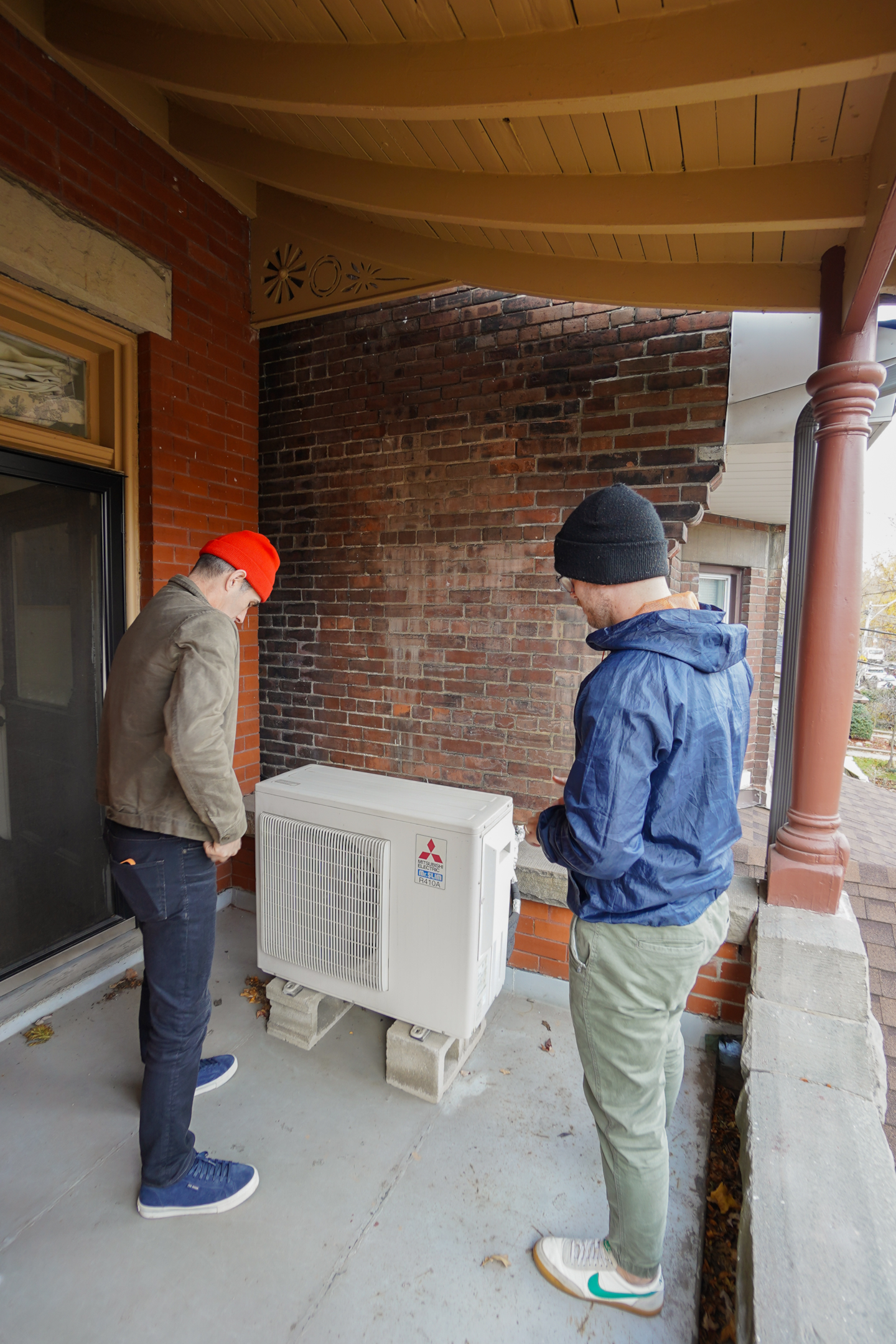
Is it cheaper to run a heat pump or gas furnace?
Whether it's cheaper to run a heat pump or a gas furnace depends primarily on electricity and gas rates. Both rates fluctuate over time, although gas rates are more volatile. For homeowners operating gas furnaces, there’s no upper limit to gas prices. For electric homes, higher electricity prices increase the viability of solar projects. This allows homeowners with heat pumps to hedge against higher prices.
What is the cheapest way to run a heat pump?
The best way to decrease operating costs for heating and cooling is to upgrade the building envelope. A well-insulated and properly sealed home requires less energy to maintain comfortable temperatures, lessening the burden on your heat pump.
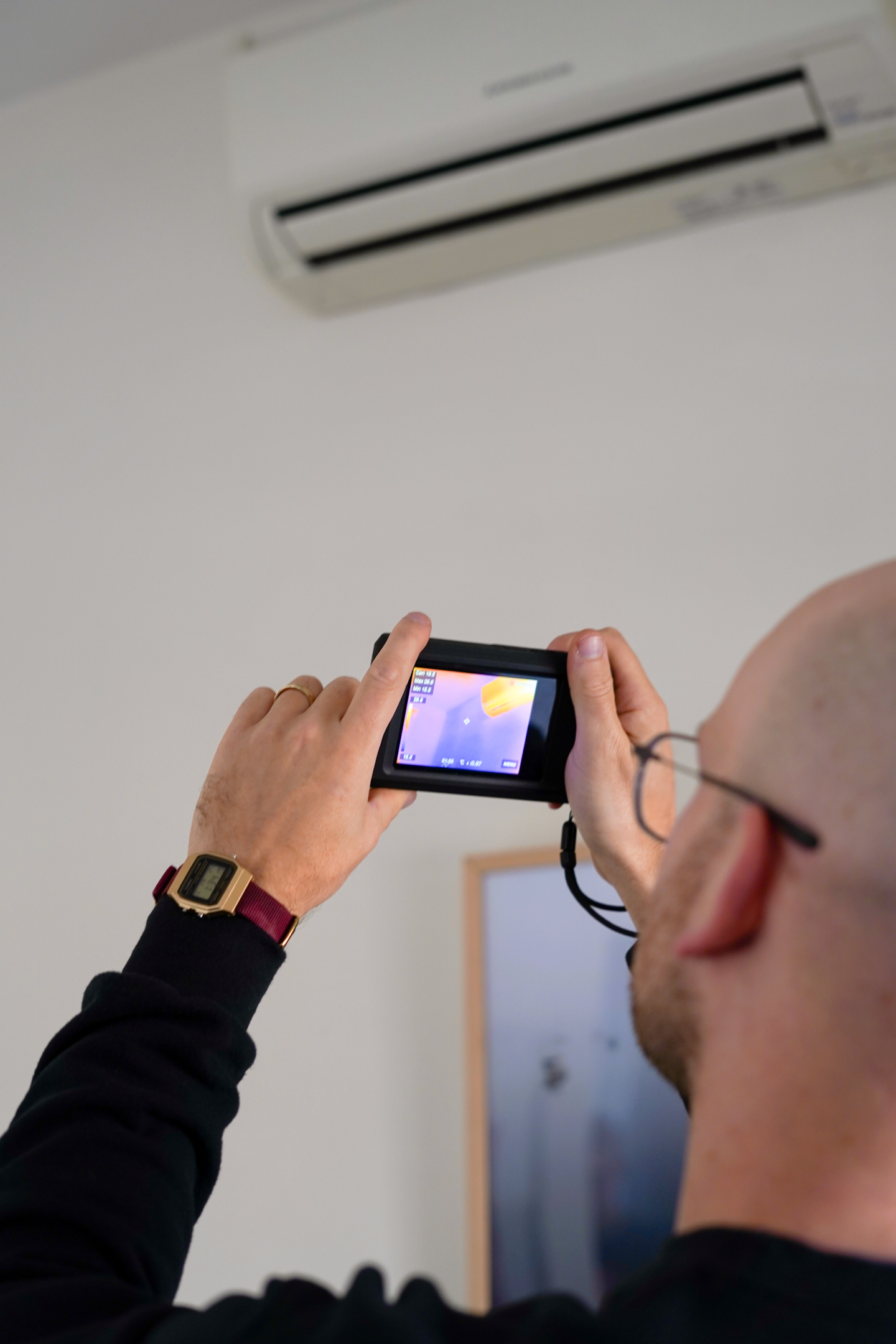
Is it better to oversize or undersize a heat pump?
It's generally better to slightly undersize rather than oversize a heat pump for your home. Here's why:
-
Efficiency: Oversized heat pumps may cycle on and off frequently, leading to reduced efficiency and increased wear and tear on the system. This short cycling can result in decreased energy efficiency and comfort, as the heat pump may not operate long enough to effectively dehumidify the air or maintain consistent indoor temperatures.
-
Comfort: An oversized heat pump may not adequately dehumidify the air, leading to indoor humidity levels that are too high. This can result in a damp, uncomfortable indoor environment and may contribute to issues such as mold growth and indoor air quality problems.
-
Initial Cost: Oversized heat pumps typically come with a higher upfront cost compared to properly sized units. Investing in a larger heat pump than necessary may result in unnecessary expenses for equipment purchase and installation.
-
Long-Term Performance: A properly sized heat pump will operate more efficiently and provide better long-term performance compared to an oversized unit. By accurately matching the heating and cooling capacity of the heat pump to the heating and cooling requirements of your home, you can maximize energy efficiency, comfort, and system longevity.
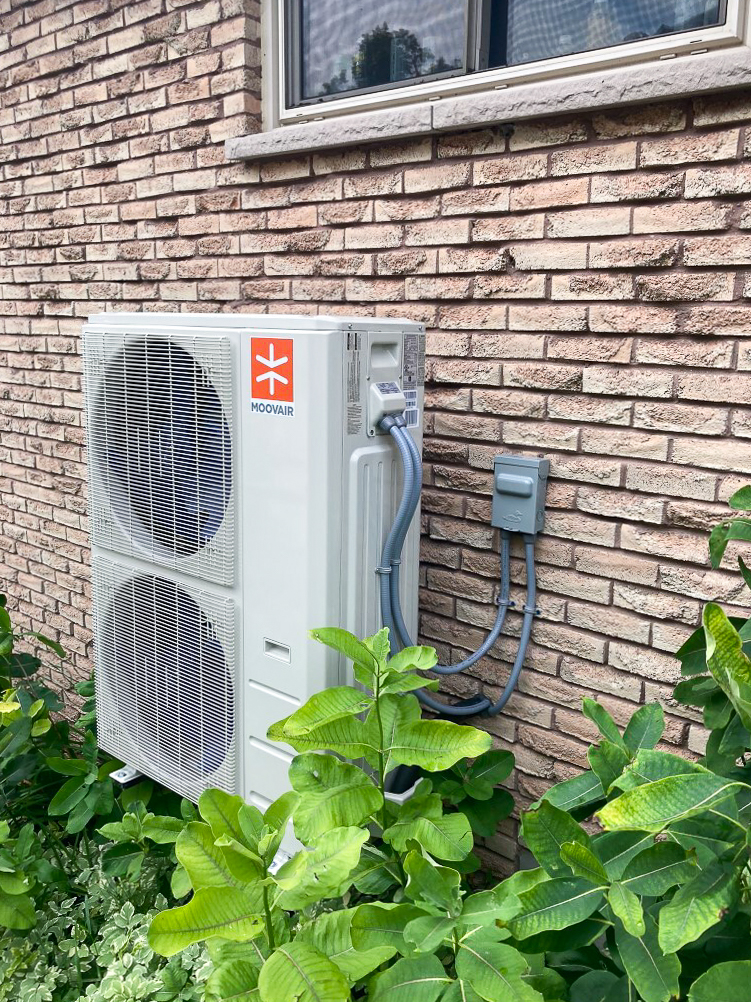
What is the best heat pump brand?
Determining the "best" type of heat pump or heat pump brand can be subjective and may depend on factors such as individual preferences, specific heating and cooling needs, budget, and availability in your area. However, several reputable heat pump brands are well-regarded for their quality, reliability, efficiency, and performance. Here are some of the top heat pump brands:
-
Daikin: Daikin is a globally recognized brand known for its innovative and high-quality heating and cooling solutions. Daikin offers a wide range of heat pumps and HVAC systems designed for various applications, including residential, commercial, and industrial settings.
-
Mitsubishi Electric: Mitsubishi Electric is another leading manufacturer of heat pumps and HVAC systems, renowned for its advanced technology, energy efficiency, and reliability. Mitsubishi Electric heat pumps are known for their quiet operation, precise temperature control, and versatility.
-
Lennox: Lennox is a well-established brand in the HVAC industry, offering a comprehensive lineup of heat pumps known for their durability, efficiency, and performance. Lennox heat pumps feature innovative technologies such as variable-speed compressors and smart thermostats for enhanced comfort and energy savings.
-
Carrier: Carrier is a trusted name in the heating and cooling industry, known for its long history of innovation and excellence. Carrier heat pumps and HVAC systems are designed to deliver reliable heating and cooling performance, with features such as variable-speed operation, advanced filtration, and intelligent controls.
-
Moovair: Moovair is a newer player in the heat pump market but has quickly gained recognition for its high-quality products and innovative features. Moovair heat pumps are designed with advanced technology to deliver efficient heating and cooling solutions while prioritising comfort and sustainability.
When choosing a type of heat pump or heat pump brand, it's essential to consider factors such as product reliability, energy efficiency ratings, warranty coverage, available features, and compatibility with your specific heating and cooling needs.
Still have questions?
If you have any further questions or need assistance with installation or maintenance, don't hesitate to reach out to our team of experts. We're here to help you enjoy all the benefits of a modern, efficient heat pump system for years to come!
Book your free virtual home consultation with a Jouleia expert here.